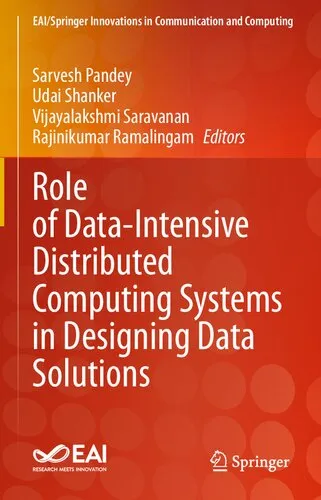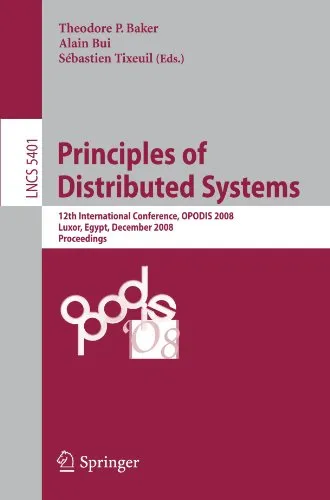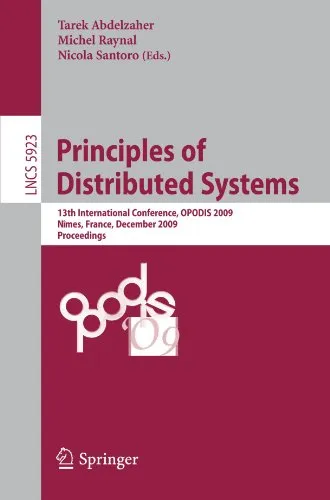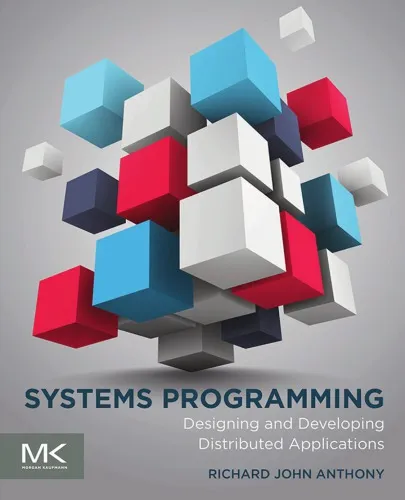Principles of Distributed Systems: 14th International Conference, OPODIS 2010, Tozeur, Tunisia, December 14-17, 2010. Proceedings
3.8
بر اساس نظر کاربران

شما میتونید سوالاتتون در باره کتاب رو از هوش مصنوعیش بعد از ورود بپرسید
هر دانلود یا پرسش از هوش مصنوعی 2 امتیاز لازم دارد، برای بدست آوردن امتیاز رایگان، به صفحه ی راهنمای امتیازات سر بزنید و یک سری کار ارزشمند انجام بدینکتاب های مرتبط:
معرفی کتاب "Principles of Distributed Systems: 14th International Conference, OPODIS 2010, Tozeur, Tunisia, December 14-17, 2010. Proceedings"
کتاب "Principles of Distributed Systems" مجموعه مقالات و یافتههای ارائهشده در چهاردهمین کنفرانس بینالمللی OPODIS است که در دسامبر ۲۰۱۰ برگزار شد. این کتاب به بررسی مباحث پیشرفته و نوین در زمینه سیستمهای توزیعشده پرداخته و شامل طیف وسیعی از تحقیقات در زمینه الگوریتمها، مدلها و پروتکلهای این حوزه است.
خلاصهای جامع از کتاب
کتاب "Principles of Distributed Systems" نمای کلی از موضوعات کلیدی را که در حوزه distributed systems مطرح است، ارائه میدهد. این موضوعات شامل طراحی و تحلیل Algorithms و پروتکلها برای محیطهای توزیعشده، مدیریت منابع در سیستمهای توزیعشده، و بررسی امنیت و قابلیت اطمینان در چنین سیستمهایی هستند.
یکی از نکات برجسته این کتاب تمرکز آن بر رویکردهای نوین و چالشهای دنیای واقعی در معماریهای توزیعشده است. نویسندگان مقالات در این کتاب به بررسی موضوعاتی همچون رفتار مشترک، تحمل خطا (Fault Tolerance)، اجماع در سیستمهای توزیعشده، و هماهنگی بین نودها پرداختهاند. این مباحث با دقت علمی و در قالب مثالهای کاربردی ارائه شدهاند.
نکات کلیدی
- درک جامع از مفاهیم پایهای در distributed systems همراه با مثالهای عملی.
- مطالعات عمیق در زمینه Consensus algorithms و چگونگی پیادهسازی آنها.
- ارائه تحقیقاتی در مورد نحوه مقابله با مشکلات Fault Tolerance در محیطهای پیچیده.
- کشف راهحلهای جدید برای هماهنگی و ارتباط کارآمد بین گرهها (Nodes) در سیستمهای توزیعشده.
جملات معروف از کتاب
این کتاب شامل دیدگاههای مهمی از متخصصان سیستمهای توزیعشده است. برخی نقلقولها عبارتند از:
“The complexity of distributed systems lies not in the computation but in the communication and coordination among nodes spread across networks.”
“Fault tolerance is not merely a feature, but a fundamental necessity in distributed computing.”
چرا این کتاب اهمیت دارد؟
کتاب "Principles of Distributed Systems" نهتنها برای پژوهشگران و دانشجویان حوزه distributed computing بلکه برای مهندسان نرمافزار و طراحان سیستم که به دنبال راهحلهای جدید و کاربردی هستند، ضروری است.
این کتاب با پوشش چالشهای موجود در سیستمهای توزیعشده و ارائه راهحلهای مدرن، زمینهای برای تحقیق و توسعه بیشتر فراهم میکند. از کاربردهای عملی این مباحث در cloud computing گرفته تا افزایش قابلیت اطمینان در distributed databases، خواندن این کتاب تاثیر بزرگی بر دانش حرفهای دارد.
Introduction to "Principles of Distributed Systems: 14th International Conference, OPODIS 2010, Tozeur, Tunisia, December 14-17, 2010. Proceedings"
The field of distributed systems serves as the foundation for many technological advancements that drive modern computing. This book, "Principles of Distributed Systems: 14th International Conference, OPODIS 2010, Tozeur, Tunisia, December 14-17, 2010. Proceedings," captures the essence of innovative and cutting-edge research presented during the 14th International Conference on Principles of Distributed Systems (OPODIS 2010). It offers a comprehensive exploration of distributed computing methodologies, algorithms, theoretical foundations, and system designs that address the challenges posed by distributed environments. Through its multidisciplinary approach, this proceedings volume provides a platform for discussing the latest developments in the field, ranging from communication protocols to fault tolerance and security in distributed systems.
Curated from a diverse set of contributions by researchers, practitioners, and thought leaders in distributed systems, the book presents groundbreaking solutions to complex problems that arise within distributed settings. By bridging theoretical insights with practical applications, it offers critical perspectives for professionals and researchers alike.
Detailed Summary
This proceedings volume is a culmination of the research contributions presented at OPODIS 2010, a premier event showcasing advanced distributed systems research. The book includes over 20 full-length papers meticulously reviewed and selected for quality and impact. Organized into thematic sections, the papers delve into a wide range of topics, such as synchronization, fault tolerance, distributed algorithms, system performance optimization, and more.
The conference proceedings placed considerable emphasis on practical and theoretical aspects of distributed systems. Experts contributed novel algorithms to address challenges in system reliability and resource management, while other papers focused on efficient communication mechanisms and their scalability in dynamic networks. Theoretical research covering consensus problems, leader election protocols, and synchronization mechanisms reinforces the strong academic rigor of this book.
The book also introduces state-of-the-art techniques in achieving fault-tolerant designs, adaptable distributed frameworks, and highly scalable architectures, which are pivotal in solving real-world distributed computing problems. Whether you are a researcher seeking to broaden your knowledge or an industry professional dealing with distributed architectures, this comprehensive collection covers the essentials of the field.
Key Takeaways
"Principles of Distributed Systems" offers numerous takeaways for professionals, researchers, and students in computing disciplines. Below are some of the key highlights:
- Comprehensive insights into distributed algorithms and their practical applications.
- In-depth coverage of fault-tolerance strategies critical for improving the reliability of distributed systems.
- Exploration of communication protocols, including scalability and synchronization in large-scale distributed environments.
- Novel approaches to security and privacy in distributed systems, addressing recent challenges related to data breaches and vulnerabilities.
- A strong theoretical foundation in distributed computing topics such as consensus, leader election, and resource optimization.
Famous Quotes
This book features many profound insights and statements by experts in the field of distributed systems. Below are a few memorable quotes from the contributions:
"Distributed systems are inherently complex, but through careful design and rigorous research, we can achieve reliability and scalability in even the most volatile environments."
"In the face of frequent disruptions and faults, the true measure of a system lies in its ability to recover and continue functioning."
"Consensus and synchronization remain the cornerstone challenges of distributed computing—we must tackle these to ensure seamless collaboration among independent entities."
Why This Book Matters
Distributed systems are the backbone of modern computing applications, from cloud platforms to blockchain technologies. This book addresses the gaps and challenges faced by researchers and practitioners in this ever-evolving field, making it a relevant and vital resource for the industry. By shedding light on theoretical advancements and practical achievements, this volume promotes further innovation and collaboration in distributed computing.
The proceedings serve as an essential documentation of the progress made in distributed systems research and act as a reference point for future work. It equips readers with the tools and knowledge required to tackle real-world problems in distributed environments, emphasizing the importance of fault tolerance, scalability, and optimization. Moreover, the concepts discussed here contribute significantly to emerging fields such as decentralized systems, IoT, and edge computing, making this book highly valuable as these fields continue to evolve.
By exploring this book, readers immerse themselves in high-caliber content that bridges the gap between theory and practical application, ensuring its place as a seminal work in the domain of distributed systems.
دانلود رایگان مستقیم
شما میتونید سوالاتتون در باره کتاب رو از هوش مصنوعیش بعد از ورود بپرسید
دسترسی به کتابها از طریق پلتفرمهای قانونی و کتابخانههای عمومی نه تنها از حقوق نویسندگان و ناشران حمایت میکند، بلکه به پایداری فرهنگ کتابخوانی نیز کمک میرساند. پیش از دانلود، لحظهای به بررسی این گزینهها فکر کنید.
این کتاب رو در پلتفرم های دیگه ببینید
WorldCat به شما کمک میکنه تا کتاب ها رو در کتابخانه های سراسر دنیا پیدا کنید
امتیازها، نظرات تخصصی و صحبت ها درباره کتاب را در Goodreads ببینید
کتابهای کمیاب یا دست دوم را در AbeBooks پیدا کنید و بخرید
1267
بازدید3.8
امتیاز0
نظر98%
رضایتنظرات:
3.8
بر اساس 0 نظر کاربران
Questions & Answers
Ask questions about this book or help others by answering
No questions yet. Be the first to ask!















